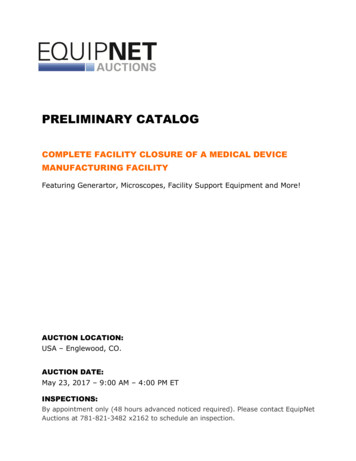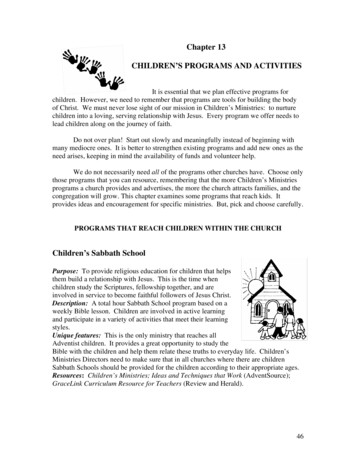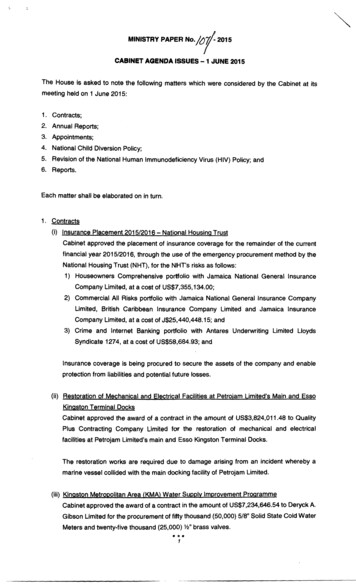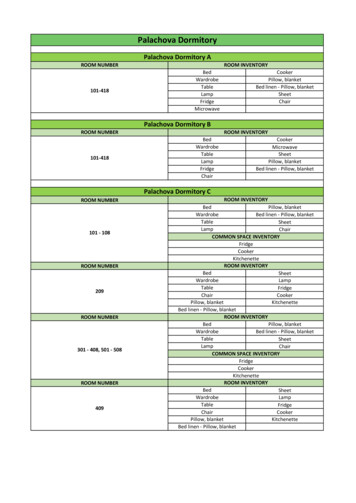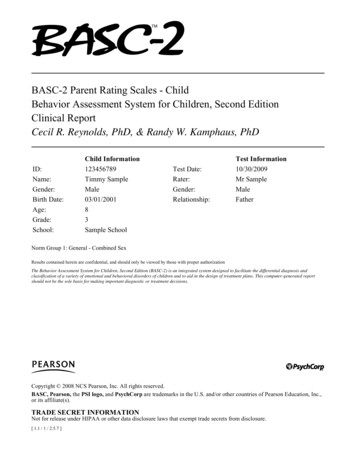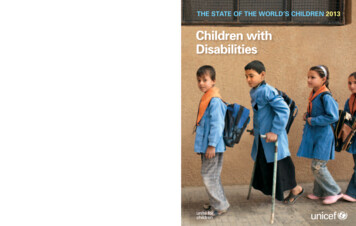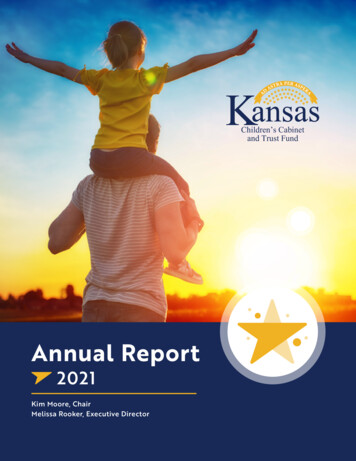
Transcription
Children’s Cabinetand Trust FundAnnual Report2021Kim Moore, ChairMelissa Rooker, Executive Director
The Kansas Children’s Cabinet and Trust Fund is housed within theKansas State Department of Education (KSDE). The Kansas Children’sCabinet and KSDE do not discriminate on the basis of race, color,national origin, sex, disability, or age in programs and activities andprovides equal access to any group officially affiliated with the BoyScouts of America and other designated youth groups. The followingperson has been designated to handle inquiries regarding thenondiscrimination policies: KSDE General Counsel, Office of GeneralCounsel, KSDE, Landon State Office Building, 900 SW Jackson, Suite102, Topeka, KS 66612, (785) 296-3204.
Improving the healthand well-being of Kansaschildren and families.
ContentsIntroduction . . . . . . . . . . . . . . . . . . . . . . . . . . . . . . . . . . . . . . . . 5Letter from the Director . . . . . . . . . . . . . . . . . . . . . . . . . . . . . . . . . . . . 6Our Commitment to Equity . . . . . . . . . . . . . . . . . . . . . . . . . . . . . . . . . 7Our Work . . . . . . . . . . . . . . . . . . . . . . . . . . . . . . . . . . . . . . . . . . . . . . . . . 7Our People . . . . . . . . . . . . . . . . . . . . . . . . . . . . . . . . . . . . . . . . . . . . . . . 82021 At-a-Glance . . . . . . . . . . . . . . . . . . . . . . . . . . . . . . . . . . . . . . . . . 11Our Progress . . . . . . . . . . . . . . . . . . . . . . . . . . . . . . . . . . . . . . . 13Overview . . . . . . . . . . . . . . . . . . . . . . . . . . . . . . . . . . . . . . . . . . . . . . . . 15Children’s Initiatives Fund (CIF) . . . . . . . . . . . . . . . . . . . . . . . . . . . . . 24Early Childhood Block Grant . . . . . . . . . . . . . . . . . . . . . . . . . . . . . . . . 34Community-Based Child Abuse Prevention . . . . . . . . . . . . . . . . . . . 39Data for Impact . . . . . . . . . . . . . . . . . . . . . . . . . . . . . . . . . . . 45Overview . . . . . . . . . . . . . . . . . . . . . . . . . . . . . . . . . . . . . . . . . . . . . . . . 46CIF Accountability Process . . . . . . . . . . . . . . . . . . . . . . . . . . . . . . . . . 48ECBG Evaluation . . . . . . . . . . . . . . . . . . . . . . . . . . . . . . . . . . . . . . . . . . 52CBCAP Evaluation . . . . . . . . . . . . . . . . . . . . . . . . . . . . . . . . . . . . . . . . . 55Our Tomorrows . . . . . . . . . . . . . . . . . . . . . . . . . . . . . . . . . . . . . . . . . . 58Kansas Early Childhood Data Trust . . . . . . . . . . . . . . . . . . . . . . . . . . 64Supporting Kansans Now and Into the Future . . . . . . . 69Overview . . . . . . . . . . . . . . . . . . . . . . . . . . . . . . . . . . . . . . . . . . . . . . . . 70The Child Care Crisis . . . . . . . . . . . . . . . . . . . . . . . . . . . . . . . . . . . . . . 71Collaborating on Relief and Recovery Efforts . . . . . . . . . . . . . . . . . 76Recommendations . . . . . . . . . . . . . . . . . . . . . . . . . . . . . . . . . . . . . . . . 78Conclusion . . . . . . . . . . . . . . . . . . . . . . . . . . . . . . . . . . . . . . . . . . . . . . . 81Works Cited . . . . . . . . . . . . . . . . . . . . . . . . . . . . . . . . . . . . . . 82
Introduction Letter from the Director Our People Our Commitment to Equity 2021 At-a-Glance Our WorkCHILDREN’S CABINET52021 ANNUAL REPORT
Letter from the DirectorAfter an enormously challenging 2020 forchildren and families across the state, 2021 hasbrought a stronger sense of possibility, hope,and resilience. This year’s annual report fromthe Kansas Children’s Cabinet is evidence of ourcollective ability to transition out of hardship andwork toward sustainable system improvements.Our 2021 Annual Report reflects the collaborativenature of this important work and highlightsconnections among efforts. You’ll learn aboutactivities funded by the Preschool DevelopmentGrant, Children’s Initiatives Fund, Early ChildhoodBlock Grant, and Community-Based Child AbusePrevention program in the “Our Progress”section. We also spotlight some exciting newinitiatives, including the statewide expansion ofDolly Parton’s Imagination Library, the KansasFuture Fellows program, and the ThrivingFamilies, Safer Children national movement.The Blueprint for Early Childhood and theAll In For Kansas Kids Strategic Plan focusedour 2021 efforts on strategies central to ensuringchildren thrive. As circumstances continued torapidly change, we reminded ourselves of keypriorities shared by stakeholders in the earlychildhood care and education system: Empowering communities: How can stateagencies encourage and support communitieswho are “all in for Kansas kids?” In whatways can agencies, coalitions, and statewideorganizations enact system improvements thatmake sense and are responsive to local needsgiven the existing momentum in communities? Collaborating around relief and recovery:How are we learning what the specific needsand barriers are for families and providers?How can we offer thoughtful solutions and aswift response along with building better longrange pathways and opportunities? Elevating the workforce: How are weunderstanding the specific ways that ouralready-stressed child care system andworkforce is collapsing and has historicallybeen undervalued? How are we working torecruit, retain, and value early childhood careand education providers?CHILDREN’S CABINETIn the “Data for Impact” section, you’ll read aboutmultiple ways the Kansas Children’s Cabinetsupports evaluation and innovation around datacollection and use. We are particularly proud tobe the Trustee of the new Kansas Early ChildhoodData Trust and excited to present early resultsof our first Authorized Project. These resultsconfirm that kids participating in early childhoodservices are significantly less likely to be removedfrom the home and referred to foster care.Finally, we present special sections devoted todiscussion of the child care crisis and pandemicrelief/recovery efforts in the early childhoodsector. We close with a synopsis of KansasChildren’s Cabinet recommendations over thecourse of the year with updates on progress.As a state, we are well positioned to make thiscoming year an even better one for the childrenand families we serve. We look forward tocontinuing efforts to imagine and implement abrighter future for all Kansans.62021 ANNUAL REPORT
Our Commitment to EquityThe Kansas Children’s Cabinet recognizes that equitable life outcomes start with an earlychildhood system that acknowledges children and families experience disproportionate accessand opportunity across race, ethnicity, socio-economic status, gender identity, sexual orientation,physical and developmental abilities, home language, and geography. Equity is an organizingprinciple of the All In For Kansas Kids Strategic Plan.The Kansas Children’s Cabinet is committed to: meetingthe diverse and unique needs of all Kansas families by integrating systems-wideapproaches to ensure basic needs are available and accessible elevatingfamily voice and choice utilizingdata in ethical, timely, and responsive ways in partnership with communitiesand a broad array of experts equitablyfunding programsChampionElevates the importanceof investing in earlychildhood and contributesto innovative programapproaches.Our WorkConnectorManagerManages grantmaking,fund administration,and strategic planningprocesses.Convenes diversestakeholders in children’sissues from government,nonprofit, and theprivate sector.StrategistIdentifies opportunitiesfor effective collaborationand overcomes barriersto optimal systemperformance.EvaluatorEvaluates use of theCIF, contributes to datainformed decision making,and offers practice andpolicy recommendations.CHILDREN’S CABINET72021 ANNUAL REPORT
Our PeopleKansas Children’s Cabinet MembersFIVE VOTING MEMBERS APPOINTED BY THE GOVERNORKim Moore, ChairKim Moore was appointed in 2018. He provides nonprofit consulting through his firm, AchievePhilanthropy, LLC. In 2018, he retired after three decades as President of United MethodistHealth Ministry Fund, and prior to this work he practiced law in Wichita. He is a graduate ofSouthwestern College and Washburn Law School, and he currently serves on several nonprofitboards. Kim and his wife, Cindy, have three children and two grandchildren.Tyler K. Smith-Howells, MD, MPH, FAAP, was appointed in 2019. She is a board-certifiedgeneral pediatrician and Assistant Professor of Pediatrics at the University of Missouri–KansasCity School of Medicine. She is also a fellowship director for the pediatrics training programat Children’s Mercy Kansas City. She has a passion for advocacy and mentorship, is happilymarried to her husband, James, and is the proud stepmother to Anthony and Arianna.LeEtta Felter was appointed in 2018. She has lived in Olathe since 1994 and isCouncilwoman-elect on the Olathe City Council. LeEtta is also the longest serving currentmember of the Olathe Public Schools Board of Education. She is Vice President of AAGInvestments and is pursuing a Doctorate of Education in Administration and Leadership (Ed.D)from Southern Nazarene University.DiAnne Owen Graham was appointed in 2018. She is President of Graham Advisors, LLC,a full-service consulting firm specializing in advising and fundraising for political and issueadvocacy organizations. She served as a political appointee in President George W. Bush’sadministration and held various roles with the U.S. Department of State. DiAnne graduatedfrom the University of Mississippi and lives in Wichita, Kansas, with her husband, Chris, andtheir sons, Owen and Parker.Terri Rice was appointed in 2017. She is Senior Marketing Manager for Cox Business and holdsboth a Bachelor of Science in Business Management and Master of Business Administration.She serves on various committees and boards, and is heavily involved in nonprofit work, givingback to the community whenever possible. Terri lives in Wichita, Kansas with her husband andhas one daughter and two step-children.CHILDREN’S CABINET82021 ANNUAL REPORT
FOUR VOTING MEMBERS APPOINTED BY LEGISLATIVE LEADERSHIPDeliece Hofen was appointed in 2020. She is a former elementary school teacher turnedprincipal who took what was once the lowest-scoring school in the Blue Valley district andturned it into one of the highest-scoring, even earning the prestigious Blue Ribbon Awardfrom the U.S. Department of Education. She is also mom to Braden, the namesake of theorganization she founded in 2010, Braden’s Hope for Childhood Cancer.Monica Murnan was appointed in 2020. She is a licensed teacher and administrator whofounded the Family Resource Center in Pittsburg, Kansas. She currently serves as Director ofStudent Support Services at Greenbush and has served on many nonprofit boards. She alsoserved four years on the Pittsburg City Commission with one year as Mayor. Monica and herhusband of 33 years, Rob, have three daughters and two grandchildren.John Wilson was appointed in 2019. He joined Kansas Action for Children in September 2017as President and CEO. He spent the previous 10 years working at the intersection of design,public health, and policymaking. John helped build the Alliance for a Healthier Generation intothe nation’s leading nonprofit organization focused on children’s health. He is a 2006 graduateof the University of Kansas, where he studied visual communication.Dinah Sykes (Outgoing), Senator, was elected in November 2016 to represent District 21 andwas appointed in 2017. Her Senate committee assignments include Commerce, Education,Ethics, Elections, Local Government, and a Joint Committee on Information Technology. Prior toelection, Dinah enjoyed being a full-time stay-at-home mom who also ran her own business asa personal chef. She is a graduate of Trevecca Nazarene University in Nashville, Tennessee.Renee Erickson (Incoming), Senator, was appointed in 2021 and represents District 30. Hercareer experience includes working as a teacher, a data and assessment coordinator, a middleschool principal, a financial planner, and the director of the USD 259 instructional technologycenter. She holds undergraduate degrees in both business and education with a master’sdegree in public school administration from Baker University, and a master’s degree in familylife education and consultation from Kansas State University.EX-OFFICIO MEMBERSLaura Howard, J.D. Secretary, KansasDepartment for Children and Families(Tanya Keys, Designee)Keynen J. Wall, J.D. Kansas SupremeCourt JusticeHope Cooper Deputy Secretary, KansasDepartment of Corrections, JuvenileJustice AuthorityBlake Flanders, Ph.D. President& CEO, Kansas Board of Regents(Karla Wiscombe, Designee)Janet Stanek (Incoming) Secretary,Lee A. Norman, M.D (Outgoing),Kansas Department of Health &Environment (Rachel Sisson, Designee)Randy Watson, Ed.D. Commissioner ofEducation, Kansas State Department ofEducation (Amanda Petersen, Designee)CHILDREN’S CABINET92021 ANNUAL REPORT
Kansas Children’s Cabinet StaffMelissa Rooker was named Executive Director of the Kansas Children’s Cabinet in February2019. Prior to this, Melissa served three terms in the Kansas House of Representatives,focusing on children’s issues and public education. Before running for office, Melissa spent 15years as a development executive. She holds a BFA from the University of Kansas and lives withher husband, Tom, in Fairway. They have two children and one grandson.Amy Meek joined the Kansas Children’s Cabinet in 2015. Prior to this, Amy spent six yearsat Community Action, Inc. in Topeka, first as the Early Childhood Education Coordinator andfinally as the Director of Head Start and Early Head Start. She has experience in programmanagement, grant writing, policy development, and compliance with local, state, and federalregulation. She holds a BA from the University of Kansas and an MBA from Baker University.Dyogga Adegbore joined the Kansas Children’s Cabinet in 2004. Dyogga tracks financialactivities on grants, contracts, interagency agreements and office funds, also coordinatesmeeting and travel arrangements. She has worked with agency heads in state governmentand private industry over 20 years. Most recently, Dyogga worked with the CEOs of the KansasBoard of Regents, Kansas State Fire Marshal, and Kansas State Bank Commissioner offices. Shegraduated with her Bachelor of General Studies (BGS) degree from Washburn University ofTopeka and AAS degree, Platt College.Debbie Deere joined the Kansas Children’s Cabinet in August 2020. Prior to this, Debbie ownedand operated a licensed child care center in Lansing for 27 years. She served in the KansasHouse of Representatives from 2017-2019, focusing on children’s issues, public education, andcorrections. She is a graduate of Friends University and lives in Lawrence with her husband,Kyle. They have three grown children, four grandchildren, and a Yorkie named Gus.Hannah McGahey joined the Kansas Children’s Cabinet in August 2020. Prior to this, Hannahworked on the behavioral health team at the Shawnee County Department of Correctionsand has worked as a police dispatcher. In these roles she contributed to policy conversations,worked in systems building, and developed her passion for curriculum development and adultlearning. Hannah is a graduate of Allen Community College and Fort Hays State University.CHILDREN’S CABINET102021 ANNUAL REPORT
2021 At-a-GlanceThis past year, the Kansas Children’s Cabinet hasbeen called to take its statutory role (K.S.A. 38-1901)to a new level. In response to the pandemic, theKansas Children’s Cabinet was looked to bycommunities, the legislature, and governmentagencies alike to identify service barriers,anticipate challenges, and propose and implementinteragency solutions. This report highlights ourexpanded roles as Manager, Connector, Strategist,Evaluator, and Champion across the earlychildhood care and education system. We noteinterpretations of federal and state legislation andhow we worked to quickly propose effectivepathways responsive to the needs of Kansans. Our2020 Needs Assessment Update confirmed thatit matters where you live in Kansas and that stateagencies must respond with solutions thatminimize burden and reflect the uniquecircumstances of communities across Kansas.2021 COVID-19 Relief Effortsacross the early childhood careand education systemOur Tomorrows Action LabsSunflower Summer ProgramRemote Learning GrantsChild Care Health ConsultantsSustainability GrantsHero Relief ProgramLinks to Quality Response PhaseUnder extraordinarily difficult pandemic and economic conditions, the Kansas Children’sCabinet stepped into this elevated role with the nimbleness and dynamism necessary to enactmeaningful change. Our work as a champion for innovation and as a convener and strategistfor effective collaboration uniquely positions us to make a difference. We did so by payingparticular attention to these three overarching concerns: Empowering communities across Kansas Collaborating around pandemic relief and recovery Elevating and supporting the early childhood care and education workforceThe Governor’s Council on Education recentlyrecognized our adeptness in this elevated roleby recommending that the state, “leveragethe capacity of the Kansas Children’s Cabinetto blend and braid federal pandemic reliefresources with other sources of state and localfunding—both public and private—to provideimmediate assistance to the child care sector.”Over the past year, we served as an experiencedCHILDREN’S CABINETgrantmaker that catalyzed community-drivenresponse to the COVID-19 pandemic by creatingreporting standards and compliance protocols.And, as detailed in this year’s annual report, werepeatedly demonstrate that federal, state, andprivate dollars can effectively be blended, braided,and bundled to enable community adaption andinnovation to meet local needs.112021 ANNUAL REPORT
FY 2021 Kansas Children’s Cabinet BudgetON-GOINGTobacco MasterSettlement eral Relief andRecovery Funding 52,397,527FundingFunding TypeTime PeriodAmountChildren’s Initiatives FundTobacco Master SettlementFundingOn-going 52,397,527Community-Based ChildAbuse PreventionFederal FundingOn-going 979,817Preschool DevelopmentGrantFederal Grant3 Years 8,943,00PDG Supplemental Award &Remote Learning GrantsFederal Relief and RecoveryFundingOne-Time 7,076,478 8,943,000 979,817Children'sCommunity-BasedInitiatives Fund Child Abuse PreventionPreschoolDevelopment Grant 7,076,478PDG Supplemental Award& Remote Learning GrantsThere were a few particularities of 2021 that made the Children’s Cabinet the steward of a largerbudget than normal. The Kansas Children’s Cabinet received one-time pandemic relief funding forthe Remote Learning Grant and Federal Preschool Development Grant Supplement.The Kansas Children’s Cabinet is charged by statute to manage and evaluate the use of the Children’sInitiatives Fund (CIF), which is funded by Kansas’s Tobacco Master Settlement Agreement dollars.CIF is one of the largest sources of funding for children and families programming in the state andincludes the Early Childhood Block Grant (ECBG). The Children’s Cabinet is also the State Lead forCommunity-Based Child Abuse Prevention (CBCAP) programs in Kansas. This is a federal primaryprevention program which supports community-based work to prevent child maltreatment before itstarts. Details on CIF, ECBG, and CBCAP are found in the “Our Progress” section of this report.In collaboration with other state agencies, the Kansas Children’s Cabinet applied for and won acompetitive Preschool Development Grant, a 3-year federal commitment. These dollars support theKansas Children’s Cabinet in leading cross-sector collaborative work to strengthen Kansas’s earlychildhood care and education system for all families, including the development and implementationof the All in for Kansas Kids Strategic Plan.In no small part due to our leadership of these collaborative efforts, the Kansas Children’s Cabinethas been well positioned to coordinate distribution of federal recovery and relief funding to meet theneeds of families and communities hit hardest by the COVID-19 crisis.CHILDREN’S CABINET122021 ANNUAL REPORT
Our Progress Overview Strategic Plan Updates Dolly Parton’s ImaginationLibrary Expansion Program Profiles SENT Topeka CIF Preventative Legal Services CBCAP Thriving Families, Safer Children ECBG CBCAP Demonstration Projects CHILDREN’S CABINET13New Initiative Spotlights2021 ANNUAL REPORT
Our vision for earlychildhood in Kansas isthat every child thrives.CHILDREN’S CABINET142021 ANNUAL REPORT
OverviewThe Kansas Early Childhood Systems BuildingNeeds Assessment and All In For KansasKids Strategic Plan guide us as we developand strengthen cross-agency collaborationsthat center families’ needs and help ensure allchildren thrive.View these documents online atkschildrenscabinet.org:Kansas Early Childhood Systems BuildingNeeds AssessmentThe plan offers structure and direction, but even2020 Needs Assessment Updatean excellent strategic plan has its limitations.We must be able to respond to changingAll In For Kansas Kids Strategic Plancircumstances, pivot when necessary, and directthe work day-to-day. Given the rapidly evolvingenvironment of the pandemic, we are presented with both a daunting threat requiring immediateaction – and an opportunity to rethink how we work and make progress. To aid these efforts, theKansas Children’s Cabinet prepared an update to the state’s early childhood Needs Assessment inearly 2021, covering the time period of January to December 2020 and beginning to explore thewide-reaching impact of the pandemic.This section provides information on how our work has moved forward over the past year on keyinitiatives of the All In For Kansas Kids Strategic Plan and in response to new information gleanedfrom the 2020 Needs Assessment update. We present major milestones, profiles of fundedprograms, new initiatives, and bright spots across the early childhood care and education system.CHILDREN’S CABINET152021 ANNUAL REPORT
State-level CoordinationBuilding and growing partnerships among all state agencies that support families Goal 1Agencies and workgroups of the new Kansas early childhood care and education governancestructure actively align to implement strategic plan tactics, with particular momentum amongthe following: The State Directors Team, originally established to implement new federal funding throughthe Preschool Development Grant B-5 (PDG), is comprised of directors from the KansasChildren’s Cabinet, Kansas State Department of Education (KSDE), Kansas Department forChildren and Families (DCF), and Kansas Department of Health and Environment (KDHE). Theteam meets regularly to enact the vision for early childhood care and education in Kansasand to oversee activities of the All In For Kansas Kids Strategic Plan. Early Childhood Recommendations Panel (Panel) - The Panel is the designated workinggroup for the Kansas Children’s Cabinet as the Kansas Early Childhood Advisory Council,and 2021 marked the Panel’s first full year in existence under the new governance structure.Panel members worked to prepare and distribute two new resources for enhancingcollaboration among early childhood professionals: the Kindergarten Transitions Toolkitand the Stakeholder Resource Directory. The Panel provided feedback to various groupsthroughout the year, including those working to maximize federal relief dollars to supportearly childhood in Kansas. Child Care Systems Improvement Team (CC-SIT) - The Child Care Systems ImprovementTeam, a 20 member team meeting monthly, is comprised of child care providers and leadersfrom across the state. This team formed three active work groups: Starting and MaximizingChild Care Business, Regulatory Standards and Best Practices, and Awareness and ResourceSharing: Elevating Rural Child Care. Several state-level technical assistance organizations and initiatives, including Kansas ChildCare Training Opportunities (KCCTO), Child Care Aware of Kansas, Integrated Referral andIntake System (IRIS), Adaptive TA, Links to Quality, and the Child Care Health Consultants,are coordinating and connecting on complementary services to broaden understanding of the fullcontinuum of support available and to determine where to invest additional resources. The Kansas CommonApp streamlines the grantmaking process while reducing staffing constraintsand spurring conversations around cross-agency alignment of grant support. Several grantopportunities were piloted since development of this online portal in Fall 2020, while effortscontinue to identify possibilities for updates and enhancements. More work is needed to align statecontracts and continue refining this grantmaking and collaboration tool. Representatives from the Thriving Families Safer Children and Family First Prevention ServicesAct initiatives are blending teams from child welfare and early childhood services to help preventchild maltreatment. The four lead state agencies for early childhood care and education (KSDE, the Kansas Children’sCabinet, KDHE, and DCF) executed a Data Trust Agreement in April 2021 to oversee projects thathelp better to illustrate the effectiveness and impact of early childhood services. A thorough reviewof data, systems, and resources supporting this effort is underway and a slate of authorized projectswill be considered by the Data Trust Governance Board. Additionally, data around the indicators andmeasures of the All in for Kansas Kids Strategic Plan are part of an extensive, formal evaluation effort.CHILDREN’S CABINET162021 ANNUAL REPORT
Community-level CoordinationHelping families access the right Information to navigate successfully among systemsGoal 2 Significant outreach and new promotional materials from 1-800-CHILDREN are ensuring thisresource reaches families and communities across the state. Technical assistance to communities, known as Adaptive TA, supports local efforts to improvecoordination and build connections among such initiatives as local Head Start programs, Child CareAware, and tiny-k Part C services. DCF’s Resource Navigator program, which places Resource Agents within the highest-volume,highest-need field offices (Kansas City, Topeka, Emporia and Wichita), works to triage familiesseeking services who are typically unaware of the broad range of supports available. IRIS, a community referral tool with 30 Local IRIS Leadership Teams covering 56 counties, isexpanding across the state. IRIS recently launched a three-county network in Northwest Kansas withplans to expand to an additional 11 counties in 2022. Additional progress includes: Engaging eight teams in an IRIS Cultivation Cohort offering peer learning and targetedtechnical assistance. Six of the participating teams received IRIS Community Championcapacity-building awards totaling 15,000 aimed at addressing sustainability challenges. Currently overseeing mergers of neighboring networks in two regions to increase capacityand better help families needing services across multiple communities. Also working towarda comprehensive resource and referral network by establishing an API to exchange referralinformation between IRIS and 1-800-CHILDREN. Links to Quality and the Child Care Health Consultant Network both work in communities toenhance peer support networks for child care providers. Community organizations statewide, as recipients of PDG Quality Subgrants, are developingor expanding custom solutions for enhanced coordination, such as child care provider cohorts,resource navigators, and local “no-wrong-door” approaches for families that ease navigationburdens. PDG Quality Subgrants also support several local family engagement efforts includingcommunity awareness events and leadership teams with family member representation. A significant bright spot was the creation of a statewide enterprise system for the Ages & StagesQuestionnaires , Third Edition (ASQ-3) and Ages & Stages Questionnaires : Social-Emotional,Second Edition (ASQ:SE-2). This allows community service providers to more easily access the ASQscreening tool, which is critical for connecting children early to the right support service. Emphasisis now on training local providers to administer and use the ASQ, identifying referral workflow, andproviding support for communities to strengthen referral partnerships. Care Coordination is another bright spot with two new KDHE programs launched and starting toshow impact. Bridges, which helps families transition smoothly from Part C to Part B programs,is partnering with Infant Toddler Services to promote awareness and participation. The PediatricPilot connects a care coordinator with pediatric offices to offer a two-generation approach toreferrals, improving the well-being of both parents and children. Nearly 1,200 stories have been shared through Our Tomorrows this year, followed by severalsense-making sessions. In these sessions, participants analyze and interpret story data using theSenseMaker fram
boards. Kim and his wife, Cindy, have three children and two grandchildren. Tyler K. Smith-Howells, MD, MPH, FAAP, was appointed in 2019. She is a board-certified general pediatrician and Assistant Profes




